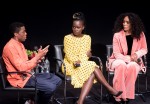Gender-neutral bathrooms and flyers promoting LGBTQ-oriented events may be rather commonplace at UCLA, but there’s still progress to be made with regard to cultivating a campus of inclusivity for gender non-conforming individuals.
It’s clear that UCLA recognizes the urgency and importance of addressing the needs of gender non-conforming faculty and students. However, the shifting dynamics of gender identity call for an adjustment to inclusive language and public spaces.
Understanding and Changing our Rhetoric
After the Trump administration issued a statement on Oct. 2 defining gender as a biological, immutable condition assigned at birth, the American Anthropological Association responded with a statement of their own.
“Gender pluralism – a means of including all sex/gender identities within the realm of plausible identities – has been shown to be useful in supporting peoples’ autonomy, self-determination and overall well-being. It is of benefit to the transgender community and society as a whole,” the statement read.
In response to this, Jessica Cattelino, a professor of anthropology at UCLA who has done research on gender and gender expression, said communities linked by certain social ties that can be autonomous and that express themselves without oppression contribute to a healthier society as a whole.
In avoiding gender assumptions, identifying yourself as an ally to non-binary populations, and educating yourself with accessible resources, you have the capacity to support the mental health of non-binary and transgender individuals, who often experience symptoms of minority stress, such as depression – especially when their identities are not reaffirmed.
In this light, Maxwell Greenberg, a trans male and doctoral candidate in the department of Chicana and Chicano studies, said navigating the territory of changing gender dynamics should not solely be work for members of the LGBTQ community. It is just as much up to cisgender and straight people to take mindful, cooperative action and transform daily rhetoric from centered around the gender binary to desegregated.
In order to deconstruct the binary that tends to dominate our culture, we must speak in terms that transcend the traditional male vs. female separation. It is a rhetoric that asks questions of curiosity, not shame, with regard to affirming one’s identity, Greenberg said. It doesn’t assume pronouns before asking; similarly, it uses words like “humankind” instead of “mankind,” or “first-year” instead of “freshman” to avoid these gendered assumptions.
“If someone corrects you about their pronouns, they’re doing it not to attack you, but because they love themselves,” said Greenberg. “We are not looking for a sorry from people who ask or mistake our pronouns. I want you to be really interested in the language that we feel affirmed in.”
In ignoring the language that respects the identities of gender non-conforming individuals, one conveys a message that the comfort of the person speaking nonaffirmingly is more important than that of an individual who has come out as transgender, nonbinary or any other variation thereof against resistance or criticism.
Integrating gender-neutral language and unlearning stark binaries of gender are two actions necessary for supporting the self-determination and improved health of groups that don’t adhere to the binary system.
An Everchanging Campus Environment for Gender Non-binary Individuals
As a leading research institute and microcosm of larger society, UCLA has a duty to ensure protection of all identities, Cattelino said.
“Trans communities are terribly underrepresented in faculty,” she said. “That affects not only teaching, but also research and the kinds of ways that we ask questions in the social sciences and humanities.”
While there are certainly improvements to be made on campus, UCLA administration and specifically UCLA’s LGBTQ Campus Resource Center have taken steps in a direction toward campus inclusivity and protection of gender non-conforming students’ rights. As a result, UCLA has been ranked one of the top schools in the nation for queer-identifying individuals.
The LGBTQ center’s website offers a list of resources and groups for gender non-conforming students and faculty like the Trans Wellness Center, Counselors in Residence, queer-inclusive sororities and fraternities, and medical programs.
UCLA also offers one of the most comprehensive coverage plans for trans students under the UC Student Health Insurance Plan, including doctor visits, hormone therapy, travel and medical procedures for trans students. In 2017, UC SHIP discussed adding male-to-female top surgery, and as of today, that surgery is a listed option for reconstruction surgeries on UCLA Health. MyUCLA also has an easy feature to change one’s preferred name.
Perhaps one of the most noticeable attributes of UCLA’s gender inclusivity is its abundance of gender-neutral bathrooms across campus. A proposal by UC student union workers to UC administration led to the 2014 construction of over 160 gender-neutral bathrooms, one of the largest numbers of all-gender restrooms of any university in the nation.
While this was a successful anti-discriminatory movement for the union, Lauren Schaeffer, a doctoral candidate in philosophy, said it lacked an aspect of full accessibility because most gender-neutral bathrooms were single-stall.
While it recognized many students’ needs, the single-stall aspect of many gender-neutral restrooms on campus contributed to massively long lines in comparison to the male or female restrooms without a line, Schaeffer said.
The single stall, while a necessary safe space for many nonconforming campusgoers, can convey the idea that people using these restrooms must be isolated, and further perpetuates an “other” nature of these spaces, separating non-binary, gender non-conforming and trans individuals. When in reality, everybody – male, female, trans, non-binary – has an equal right to use the bathroom in a timely manner.
Greenberg and Schaeffer both said they would like to see more multistall restrooms that dismantle sex segregation and allow all gender identities to exist equally in a public space.
Schaeffer and their colleagues proposed an additional draft to Policy 890 in May to convert existing multistall male or female restrooms in each current campus building to multistall gender-inclusive restrooms labeled “All Gender,” not just “Gender Neutral.”
Many trans and gender non-conforming students continue to form activist groups, fight for health care and medical benefits, and propose structural changes to rightly accommodate their needs across campus. Queer activism creates impactful change on campus, inspiring other groups or individuals to resist oppression and fight for their autonomy.
“Anybody who has experienced restriction in their lives or felt their metaphorical wings clipped by society should find a lot of common cause and follow the lead of trans activists,” Cattelino said. “They, after all, are ultimately trying to share a world in which gender is not the basis for inequality.”




